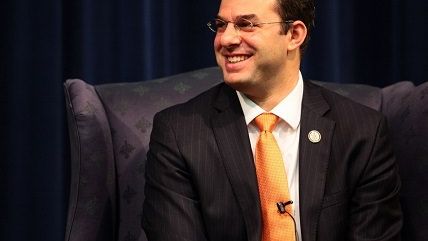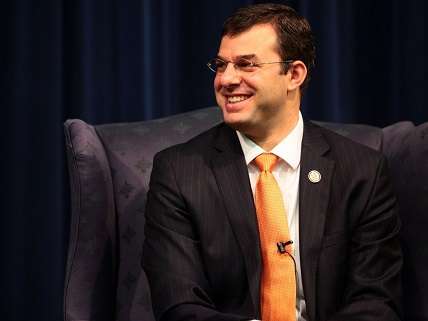Rep. Justin Amash Says Americans Are Becoming More Libertarian—And Congress Will Too.
'Our pro-liberty caucus is growing every year.'


Is the libertarian message winning? Coasting toward a major electoral victory next week, freedom-friendly Congressman Justin Amash certainly thinks so—even if Washington, D.C. isn't listening yet.
The libertarian Republican, who hails from a right-leaning district in western Michigan, is widely expected to win reelection on November 4. He already passed the real test: a significant primary challenge from a well-funded opponent backed by neoconservative and corporatist critics of Amash's views. The challenger, Brian Ellis, stooped as low as he could go, releasing an ad that accused Amash of being "al-Qaida's best friend in Congress" due to the representative's opposition to NSA spying and unauthorized wars.
The ad backfired. District voters preferred Amash's brand of skeptical anti-government conservatism to Ellis's Bush-era demagoguery.
"It felt great to get a big win," Amash told Reason in an interview. "The people of the district came out and said they like what I am offering, which is independent conservative representation, libertarian representation… My challenger was offering run of the mill, establishment big government Republicanism. People are tired of that."
Amash is optimistic that what's true for his district is true for the country at large. A growing cross-partisan swath of the electorate is concerned about issues near and dear to the hearts of libertarians, including police brutality, spying, and drone warfare.
But that doesn't mean Congress is getting on board. Leadership, in particular, remains as hopeless as ever, according to Amash.
"Congress is delayed by five or 10 years," said Amash. "But I'm hopeful some of that will start to change. The public is more libertarian, the public is saying we want people who are going to be independent and not bow to leadership in either of the major parties."
First elected to Congress during the Tea Party wave of 2010, Amash says subsequent elections brought more representatives who are sympathetic to the views of an increasingly libertarian electorate into the fold.
"Our pro-liberty caucus is growing every year," he said.
He credits Sen. Rand Paul for breaking ground as a libertarian-aligned U.S. senator and continuing to draw attention to the cause via his widely-expected presidential run.
"There's no doubt that Rand Paul has a more libertarian perspective than senators from years past and there's no doubt that it's broadly appealing to the public," said Amash. "You're seeing widespread support for Rand Paul and a lot of other presidential candidates or prospective presidential candidates are going to adopt many of his positions with the hopes of expanding their base."
Post-election, Amash wants to throw himself back into the civil liberties battle immediately. Privacy and police brutality are two issues the pro-liberty caucus could tackle, given the public's enduring interest in scaling back NSA surveillance as a result of the Edward Snowden leaks, and the fallout from the Michael Brown shooting in Ferguson, Missouri.
Amash is also still bothered by President Obama's unauthorized war against ISIS in Syria, which he said is clearly unconstitutional.
"The president doesn't have any authority to run a full-scale war without Congressional authorization," said Amash. "And he hasn't received any Congressional authorization."
Amash was equally critical of Congressional leaders Republican House Speaker John Boehner and Democratic Senate Majority Leader Harry Reid, who allowed lawmakers to leave Washington, D.C. on August recess without debating Obama's ISIS plan. His willingness to speak out against government overreach, whether propagated by Republicans or Democrats, has made enemies of some powerful people in D.C., but is undoubtedly endearing him to conservative and independent voters, as well as libertarians and anti-authoritarian liberals. He isn't letting up anytime soon.
"The wall we face right now is that leadership and the president and the chairman of several key committees are controlled by people who are anti-privacy and who are pushing for greater government control of our lives and our information," said Amash.
Despite the significant hurdles, Amash remains genuinely optimistic that the future is bright for the cause of liberty.
"Things aren't going our way when it comes to the votes right now," he said. "But we are seeing things change at home in our districts and we are seeing things change with respect to the newly elected members in both parties. There is a belief in liberty that is deeply ingrained in Americans, and when we see it starting to slip away, we push back against the system."
More from Reason on Justin Amash here.
